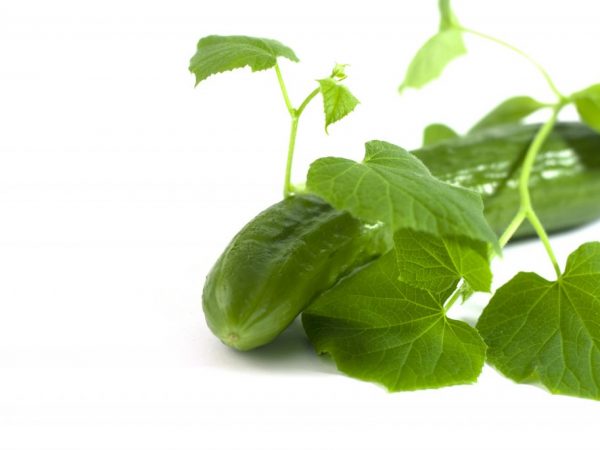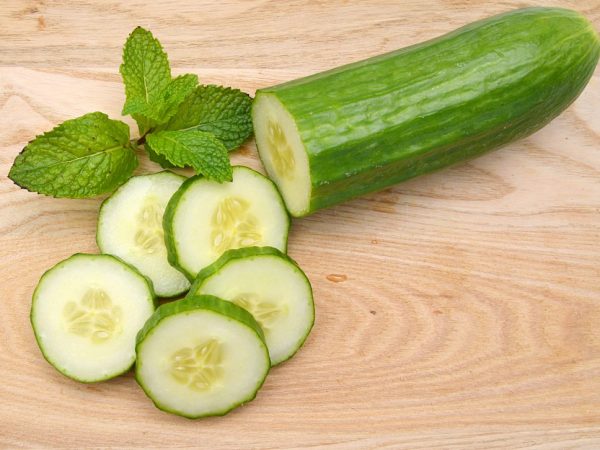What is in a cucumber
A delicious vegetable has long taken pride of place on the tables of compatriots. However, not everyone knows about the nutritional value of the plant. What is in a cucumber? We will analyze in detail the useful trace elements and indicators of the food intake.

Cucumber composition
The nutritional value
Cucumbers belong to the pumpkin family. They are thermophilic, preferring to grow in sunny areas with nutritious soil. Today there are a huge number of varieties and hybrids that allow you to grow a vegetable in any climatic conditions.
Cucumbers are 97% water. When consumed moderately and correctly, vegetables contribute to the health of the body.
The nutritional value of the product is presented in the table.
| Name | Quantity in 100 g | % of the norm in 100 g |
| Protein | 0,79 | 1,1 |
| Fats | 0,1 | 0,21 |
| Carbohydrates | 2,4 | 1,2 |
| Calories | 14 | 5,8 |
| Alimentary fiber | 1 | 5 |
Due to the low content of bju, cucumbers are used in dietary nutrition for weight loss. The unique blend of plant fiber and fluid helps the stomach to better handle digestive stress. The plant contains tartronic acid, which inhibits the conversion of carbohydrates into fats.
Macronutrients
Of course, cucumbers do not have as many useful components as in oranges or apples, but the substances are in an easily digestible form, which allows the body to quickly obtain vitamins and minerals. All elements retain useful properties only fresh.
Potassium
Potassium in cucumber, together with sodium, is responsible for the water balance of the body and the correct functioning of the heart. 100 g of pulp contains 130 mg. With a deficiency of potassium, the functions of muscles and nerves suffer, and edema begins.
The substance is responsible for the functioning of all soft tissues of the body, from capillaries to the brain and liver. The component is part of the intracellular fluid and helps to remove excess water. Anti-sclerotic properties prevent the accumulation of sodium salts in the body, which saves from chronic fatigue syndrome.
Calcium
The pulp contains 25 mg of this trace element. It is a building material for bones and teeth, participates in neuronal and muscle reactions, controls the process of blood clotting and activates a number of hormones.
The component helps to remove salts of heavy metals from the body, has anti-allergic properties. Lack of calcium has a negative effect on insulin levels.
Phosphorus
Cucumbers contain at least 40 mg of phosphorus (5% of the daily value). The component participates in the work of the heart and nervous system, affects the formation of hormones, actively interacts with calcium, forming the bone tissue of the skeleton and teeth.
Phosphorus is essential for the healthy functioning of the kidneys, helps the body to grow and recover from illness, and to better absorb vitamins.
Trace elements

Cucumber contains substances important for humans
Chemicals are needed for vital processes in the body. Their concentration is not so great, but they play a significant role in the human body.
- Iodine.The product contains at least 3 mg, regulates the work of the nervous and endocrine systems, participates in the metabolism of proteins and fats, actively affects the reduction of sugar levels.
- Fluorine. Participates in the formation of bone tissue of the skeleton and teeth, improves the absorption of iron. The pulp contains at least 17 mg of this element.
- Copper. Regulates the functions of all organs, participates in hematopoietic processes, supplies cells with oxygen, helps build proteins and enzymes. 100 g of cucumbers contains 100 mg of the substance.
Vitamins
A fresh cucumber contains 10 mg of ascorbic acid. The substance affects the synthesis of hormones and improves capillary permeability, enhances the effect of antioxidants such as tocopherol and selenium. The advantage of the vegetable is that it is difficult to exceed the daily dose of the vitamin, so you can eat the product in any quantity without fear.
Another useful element is folic acid, which is responsible for the biosynthesis of proteins, fats and carbohydrates. The substance supports the quality of healthy cells in the body, which is important in the early stages of pregnancy. In addition, the component slows down the onset of menopause and corrects adolescents.
Vitamin E is a powerful antioxidant that slows down the aging of the body. The popular vegetable contains only 1% of the daily value of tocopherol. However, it is in synthesis with other components, enhancing its effect on the human body.
Vitamin PP is not so much, but it participates in the metabolism of proteins, amino acids, breaks down fats and carbohydrates. The unique substance has an anticoagulant effect and improves blood flow, helps to maintain a healthy appearance of the skin.
Beneficial features
The value of cucumber is that it is used to solve health problems.
Regular consumption of fresh cucumbers in food has a positive effect on the state of the thyroid gland, prevents the formation of cholesterol plaques on the walls of blood vessels, and is the prevention of cardiovascular diseases.
The unique chemical composition with minimal bju makes cucumbers a dietary product. Cucumbers do not cause allergies, so they are recommended for weight loss. The abundance of dietary fiber cleanses the gastrointestinal tract, contributing to weight loss.
Freshly squeezed juice is used as a cough remedy for colds and to relieve the respiratory tract of patients with tuberculosis. In addition, the fluid relieves stress and strengthens the nervous system.
Fresh has mild sedative and analgesic properties. To improve the composition of the blood, the pomace is mixed with an apple and tomato drink, after which half a glass is drunk every day.
Those who consider carbohydrates in fresh cucumber are recommended to try the product as a cosmetic mask. Active substances and an abundance of healthy water moisturize the skin, helping to keep the face in good condition. Lotion based on the product soothes irritation and removes small age spots.
Contraindications
Despite the abundance of positive properties, the vegetable also has negative sides. With excessive consumption of the product, the work of the urinary system is activated.
Cucumbers should not be eaten for the following diseases:
- stomach ulcer;
- gastritis with high acidity;
- enteritis;
- acute colitis;
- hepatitis.
Nursing mothers should be careful with the vegetable. The active ingredients in cucumbers can cause diarrhea, cramping and rumbling in a child. It is worth using only fresh and high-quality products for food without visible signs of decay. Bacteria quickly penetrate into the pulp, provoking poisoning.
Conclusion
Fresh cucumbers contain almost all the elements necessary for the body.


